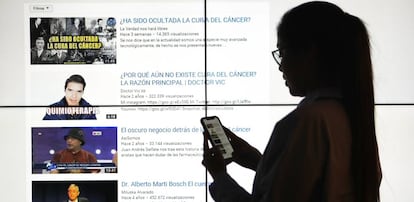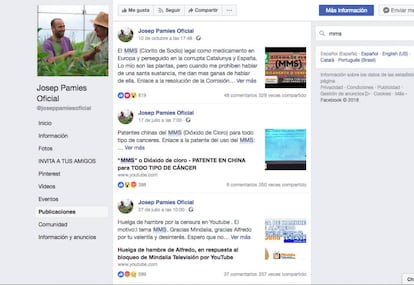The place where bleach “cures” autism and vaccines spread epidemics
Platforms such as Facebook and YouTube are failing to combat the spread of disinformation about health and hoax remedies for conditions

There is a place where cancer can be cured in just 42 hours and where all the doctors in the world are conspiring to deceive the population. It is a place where you can “cure” autism with bleach, and where vaccines, far from preventing epidemics, actually spread them.
This place is called social media, where a losing battle is being waged on a daily basis against dangerous health hoaxes and misinformation. In Spain, the internet is the second most important source of information on pseudotherapies, and two-thirds of citizens go online to read up on health issues.
There are many statements to the effect that action is going to be taken, but we are not seeing very many results
Carlos Mateos, #SaludSinBulos
Recent studies show that much of the health information available online is false. And in some cases, this misleading information is intentional. Despite this, major social media companies are allowing much of this toxic content to remain available, citing freedom of expression and their own ambiguous content-removal policies.
A joint report by the Medical Association of Barcelona, the Catalan health department and the Audiovisual Council of Catalonia analyzed 14 videos available on YouTube that make particularly dangerous assertions about health, and which have collectively been viewed more than 25 million times.
One of these videos, obtained by typing the words “cure” and “cancer” in the search box, states that cancer can be cured in 42 hours using beet juice.

The study, presented two weeks ago, said that 74% of the top 50 results that came up using those search terms contained similar false claims and other pseudoscientific messages.
All three institutions made a joint request to YouTube, asking the company to take down the videos because “they promise to cure cancer using miracle remedies with no scientific basis, and they discredit the treatments provided by medical professionals.”
YouTube did no such thing. A company spokesperson told this newspaper that they cannot comment on specific cases, but noted that YouTube abides by its own policy: “When a video has been flagged and it violates our Terms and Conditions, we remove it; when it does not, it stays on the platform.”
The power of algorithms
YouTube, Facebook and Twitter replied to this newspaper’s queries by displaying their ability to automatically remove millions of fraudulent publications and accounts through detection systems that take down videos and links before they are ever viewed. YouTube’s policies say the company does not accept “content that intends to incite violence or encourage dangerous or illegal activities that have an inherent risk of serious physical harm or death.”
And even if YouTube does not remove videos that have been reported by health authorities, it can stop them from making money from ads, and disincentivize channels created to make money through misinformation. Engineers can also manually “conceal” undesired videos to stop the algorithm from recommending them. Yet a search for the terms “cure” and “cancer” continues to yield an overwhelming amount of fake content.
This past summer, Mark Zuckerberg’s company shut down more than 80 English-language accounts with ties to pseudoscience and health hoaxes as part of its campaign against online misinformation.
Josep Pàmies, one of the most popular communicators of pseudoscience and fake remedies in Spain, has more than 330,000 Facebook followers all over the world. This newspaper contacted the social media company to know what criteria it follows to keep the account open, since Facebook claims to be trying to fight disinformation and says its priority is preserving people’s safety.
On his Facebook page, Pàmies insistently vilifies medicine and recommends all kinds of fake remedies, such as a type of diluted industrial bleach called MMS (short for Miracle Mineral Solution) that purportedly works as a medical panacea, curing everything from Ebola to autism. This product has been banned since 2010 by the Spanish Health Ministry because of its potential for serious adverse health effects, and Pàmies is facing sanctions from the Catalan government for promoting it.
On Wednesday, just hours after being queried about Pàmies’ Facebook page, the latter became temporarily unavailable. The company replied that it follows strict rules about MMS promotion: “These publications were deleted, but the page was erroneously deleted at the same time,” it said.
Pàmies’ website has been considered especially dangerous by the Observatory Against Pseudoscience, an oversight body run by the medical association Organización Médica Colegial (OMC), which represents the nearly 250,000 licensed medical practitioners working in Spain. Meanwhile, Pàmies has been denouncing attempts to curtail his freedom of expression.
Speech vs reach
Reneé DiResta, an expert on media and misinformation, notes that there is a difference between “freedom of speech and freedom of reach.” In a column for Wired magazine, she underlined that “YouTube’s video-recommendation algorithm inspires 700,000,000 hours of watch time per day – and can spread misinformation, disrupt elections, and incite violence […]. There is no right to algorithmic amplification. In fact, that’s the very problem that needs fixing.”
“YouTube is the world’s second search engine and it is full of false information. In some cases, and for certain diseases and health issues, there is more fake information than real information,” adds Carlos Mateos, coordinator of the initiative #SaludSinBulos (HealthWithoutHoaxes). “There are many statements to the effect that action is going to be taken, but we are not seeing very many results.”
They promise to cure cancer using miracle remedies with no scientific basis, and they discredit the treatments provided by medical professionals
Catalan health study
According to a study by Spain’s Sociology Research Center (CIS), the internet is the second most important source of information on pseudotherapies (22.4%), after word of mouth. And another study by the National Telecommunications Observatory shows that 60.5% of Spaniards get their health information online.
Social media have been flooded with ill-intentioned hoaxes for a long time. Half of all messages about vaccines posted on Twitter contain anti-vaccine beliefs, according to a study that analyzed 550,000 tweets between 2009 and 2015, published in Social Sciences & Medicine.
During the Zika pandemic in the United States, a group of researchers monitored information about the virus available on Facebook. “We found that misleading posts were far more popular than the posts dispersing accurate relevant public health information about the disease,” noted the researchers, who published their study in the American Journal of Infection Control.
English version by Susana Urra.
Tu suscripción se está usando en otro dispositivo
¿Quieres añadir otro usuario a tu suscripción?
Si continúas leyendo en este dispositivo, no se podrá leer en el otro.
FlechaTu suscripción se está usando en otro dispositivo y solo puedes acceder a EL PAÍS desde un dispositivo a la vez.
Si quieres compartir tu cuenta, cambia tu suscripción a la modalidad Premium, así podrás añadir otro usuario. Cada uno accederá con su propia cuenta de email, lo que os permitirá personalizar vuestra experiencia en EL PAÍS.
¿Tienes una suscripción de empresa? Accede aquí para contratar más cuentas.
En el caso de no saber quién está usando tu cuenta, te recomendamos cambiar tu contraseña aquí.
Si decides continuar compartiendo tu cuenta, este mensaje se mostrará en tu dispositivo y en el de la otra persona que está usando tu cuenta de forma indefinida, afectando a tu experiencia de lectura. Puedes consultar aquí los términos y condiciones de la suscripción digital.









































